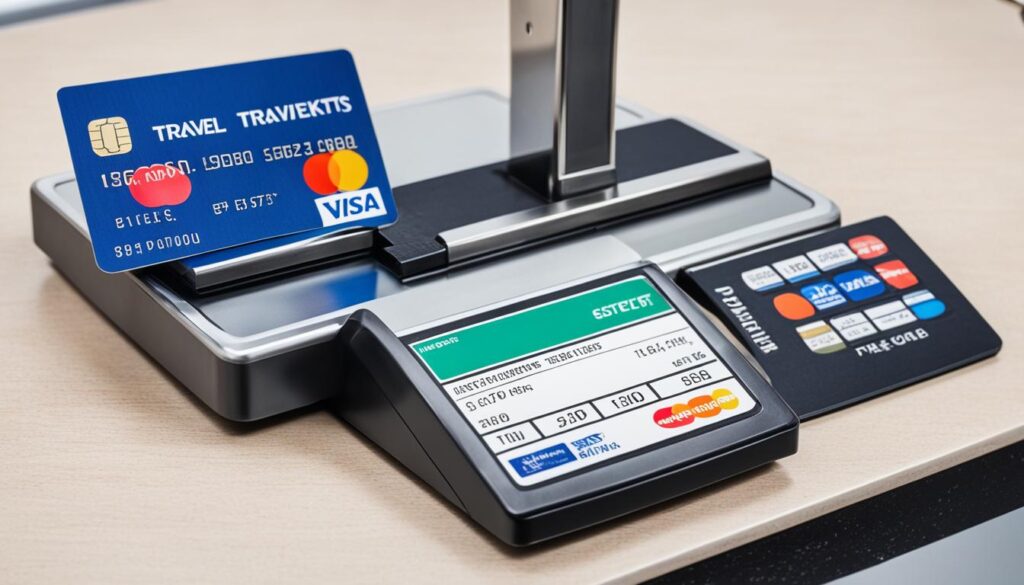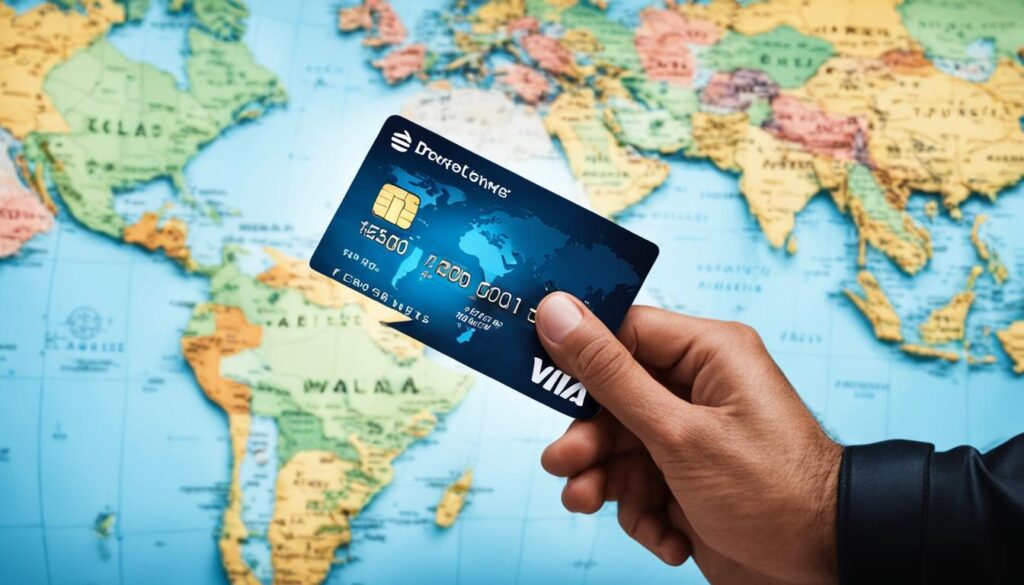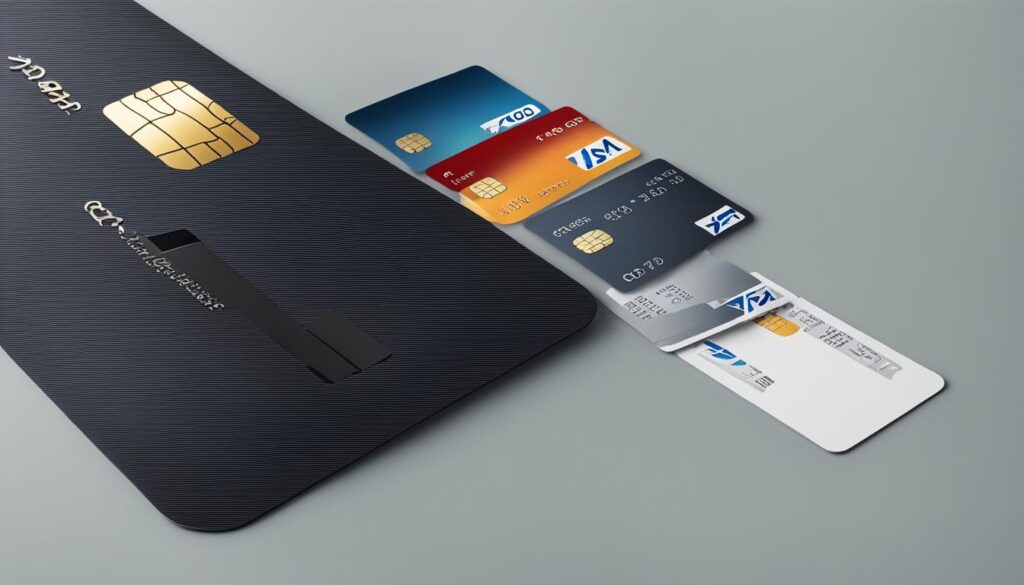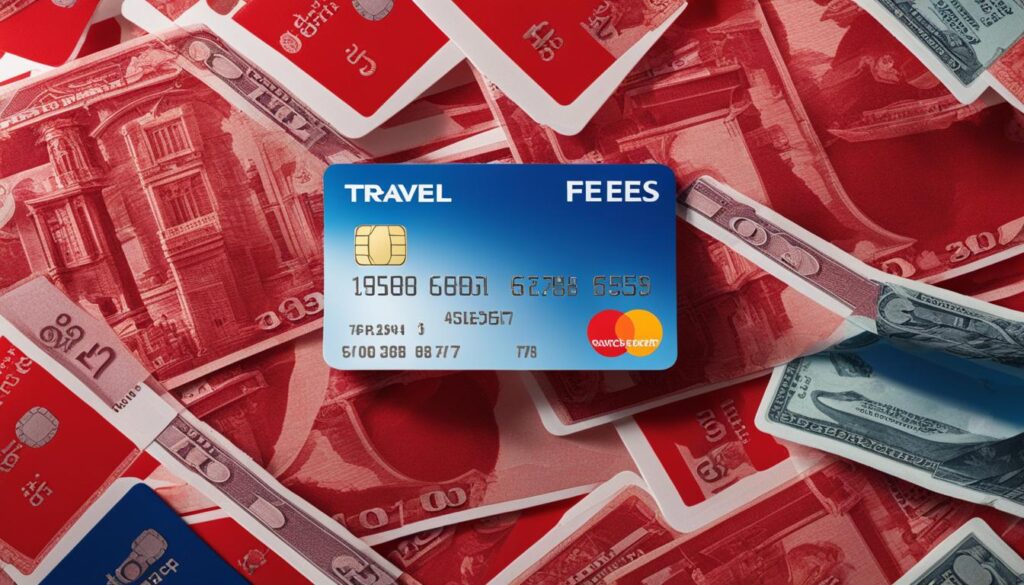Are you planning to travel soon and worried about the fees and charges associated with using your credit card abroad? If so, you’re not alone. Many travelers face hefty credit card fees and charges, which can quickly add up and put a damper on your trip. But don’t worry – there are ways to avoid these fees and charges and enjoy a stress-free travel experience.
In this section, we will discuss essential tips on how you can avoid travel credit card fees and charges, allowing you to have a stress-free globetrotting experience while maximizing your savings. Whether it’s avoiding travel credit card fees or minimizing credit card fees for travel, we’ve got you covered.
With our help, you’ll be able to understand the different travel credit card fees and charges associated with using your credit card while traveling, find the best credit cards with no foreign transaction fees, plan your currency exchange in advance, and much more. Let’s dive in and discover how you can travel the world without any unnecessary expenses.
Understand Travel Credit Card Fees and Charges
Using a travel credit card can come with various fees and charges, which can add up quickly and impact your budget. It’s important to familiarize yourself with these fees before embarking on your trip, so you can plan your expenses accordingly and avoid any surprises. Here are the common travel credit card fees and charges to watch out for:
| Fee/Charge | Description |
|---|---|
| Foreign transaction fee | This fee is charged when you use your credit card to make a purchase in a foreign currency. It’s usually around 3% of the transaction amount. |
| Cash advance fee | You’ll be charged this fee when you withdraw cash using your credit card at an ATM. It’s usually a flat fee or a percentage of the amount withdrawn. |
| Balance transfer fee | If you transfer a balance from another credit card to your travel credit card, you may be charged a fee, which is usually a percentage of the balance transferred. |
| Late payment fee | If you miss a payment deadline, you’ll be charged this fee, which can be significant. |
| Annual fee | Some travel credit cards charge an annual fee, which can range from $50 to $500, depending on the card’s benefits. |
Knowing the different fees and charges associated with using your travel credit card can help you identify expenses you can avoid or minimize. For instance, using your credit card to withdraw cash from an ATM is usually more expensive than paying directly with your card. Also, choosing a travel credit card with no foreign transaction fees can save you a significant amount of money.
Next, we’ll explore how to choose a travel credit card that suits your needs and budget, and that can help you avoid unnecessary fees and charges.
Choose a Travel Credit Card with No Foreign Transaction Fees
When searching for a suitable travel credit card, one of the essential factors to consider is whether it charges foreign transaction fees. These fees can add up quickly, especially if you’re traveling frequently. You’ll want a card that doesn’t charge any.
Many credit card issuers offer travel-specific cards with no foreign transaction fees. Some of the most popular options include Chase Sapphire Preferred, Capital One Venture Rewards Credit Card, and Bank of America Travel Rewards Credit Card. When researching travel credit cards, be sure to read the fine print and compare the fees and benefits to find the one that best suits your needs.
How to Choose a Travel Credit Card with No Foreign Transaction Fees
When looking for a travel credit card with no foreign transaction fees, keep the following tips in mind:
- Check the card’s terms and conditions to ensure it doesn’t charge any foreign transaction fees or other hidden fees
- Confirm that the card offers rewards or benefits that align with your travel habits or preferences
- Compare the annual fee with the potential savings you’ll receive from avoiding foreign transaction fees
- Consider the card’s interest rate, particularly if you plan to carry a balance on the card
By selecting a travel credit card with no foreign transaction fees, you can avoid significant fees and charges while enjoying the convenience and security of paying with a credit card while traveling.
Plan Your Currency Exchange in Advance
When traveling abroad, it’s essential to plan your currency exchange in advance to avoid travel credit card fees and charges. One way to minimize fees is to exchange currency before you leave home.
Tip: Research exchange rates at several banks or currency exchange offices to find the best rates and avoid high fees. Also, be aware that exchange rates at airports are typically much higher than rates at other locations.
If exchanging currency before your trip is not an option, another tip is to withdraw money in local currency from an ATM using your travel credit card. However, be sure to check with your bank about any international withdrawal fees and understand the exchange rate used for the transaction.
Note: Some countries may be cash-dependent, so it’s always a good idea to carry some cash on hand. Just be cautious of carrying too much and ensure it’s stored securely.
Notify Your Credit Card Company Before Traveling
Are you planning to use your travel credit card during your next trip? Make sure you contact your credit card company beforehand to avoid any inconvenience and additional travel credit card fees or charges.
Notifying your credit card company of your travel plans can prevent unexpected card freezes or transaction denials, ensuring that your travel experience goes smoothly. Credit card companies monitor your activity for potential fraudulent activity, and if they detect an unusual purchase in a foreign country without prior notification, they may block or freeze your account, causing significant inconvenience.
To avoid this, reach out to your credit card company’s customer service before embarking on your trip. You can usually do this online or by phone. Provide details such as the countries you’ll be visiting, dates of travel, and your contact information. This information will be added to your account, so the credit card company will know that it’s you who’s making purchases in a foreign country, and not someone else using your card information.
By simply notifying your credit card company before your trip, you can eliminate the risk of an account freeze, and avoid travel credit card fees and charges as well. This small step can save you money and hassle in the long run, while ensuring a stress-free journey.
Use ATMs Wisely for Cash Withdrawals
While using your travel credit card for various expenses during your travel, it’s also important to plan ahead for cash withdrawals. ATM fees can add up quickly and eat into your travel budget.
First, find ATMs that don’t charge high withdrawal fees. Check with your bank and credit card companies to see if they have partnerships with banks abroad for discounted or free withdrawals.
Next, take out larger amounts of cash to avoid frequent withdrawals and their subsequent fees. However, keep in mind the safety concerns of carrying too much cash with you.
Consider getting a debit card designed specifically for traveling, such as Charles Schwab’s High Yield Investor Checking account. These accounts often reimburse all ATM fees, allowing you to withdraw cash without any added charges.
Tip: Avoid exchanging currency at the airport ATMs, as they are known to charge exorbitant fees.
Be Cautious with Dynamic Currency Conversion
Dynamic Currency Conversion (DCC) is a service that allows you to pay for purchases abroad in your home currency. While this may seem convenient, it often comes with added fees and unfavorable exchange rates, resulting in higher travel credit card charges. If you choose to use DCC, you could end up paying up to 7% more, which can add up quickly, especially for large transactions. It’s important to be cautious when presented with this option and consider the additional fees you may incur.
If you want to avoid DCC, opt to pay in the local currency instead. This way, your credit card company will handle the exchange rate, providing you with more favorable rates and lower travel credit card fees and charges. It’s important to note that some merchants may offer DCC automatically, so always be mindful and ask to pay in local currency instead.
| DCC Pros | DCC Cons |
|---|---|
| Convenient for travelers who want to know the exact amount they are spending in their home currency | Higher exchange rates and additional fees |
| No need to calculate exchange rates or carry local currency | Merchants may set their exchange rates, which can result in hidden fees |
| May offer immediate refunds for returns or cancellations | May have a negative impact on your credit score |
Overall, avoiding dynamic currency conversion is a smart way to reduce travel credit card charges and fees. If you’re uncertain about the fees or exchange rates associated with your credit card while traveling abroad, don’t hesitate to contact your credit card provider for more information.
Read the Fine Print of Your Credit Card Agreement
It’s crucial to familiarize yourself with your credit card agreement to avoid hidden travel credit card fees and charges. Credit card companies may have different policies and fees associated with traveling abroad. To avoid unpleasant surprises, make sure to read the fine print and understand the terms and conditions of your credit card agreement.
Common travel credit card fees to watch out for include foreign transaction fees, ATM withdrawal fees, and cash advance fees. These fees can add up quickly, significantly increasing the cost of your travels.
Also, be aware of the credit card’s grace period and interest rates, as well as fees for late payments or exceeding your credit limit. Keep in mind that some credit cards offer travel rewards and perks that may justify their annual fees.
By carefully reviewing your credit card agreement, you can avoid unnecessary travel credit card fees and charges and make informed choices that suit your travel needs and budget.
Monitor Your Credit Card Activity Regularly
While traveling, it’s important to keep a close eye on your credit card activity to avoid any surprises with unexpected fees or charges. Be sure to check your account regularly for any unauthorized transactions or suspicious activity.
You can easily monitor your credit card activity by setting up alerts through your credit card company’s app or website. This allows you to receive notifications for every transaction made on your card, giving you the opportunity to catch any fraudulent activity right away and avoid potential fees.
Another helpful tip is to keep all your receipts and compare them against your credit card statement at the end of your trip. This way, you can identify any discrepancies and bring them to the attention of your credit card company before they turn into bigger problems.
By staying vigilant and monitoring your credit card activity regularly, you can avoid unnecessary travel credit card fees and charges, giving you peace of mind and a stress-free travel experience.
Conclusion
Now that you know how to avoid travel credit card fees and charges, you can save money and enjoy your travels without financial worries. By understanding the different fees and charges associated with credit card use while traveling, choosing a travel credit card with no foreign transaction fees, planning your currency exchange in advance, notifying your credit card company of your travel plans, using ATMs wisely, being cautious of dynamic currency conversion, reading the fine print of your credit card agreement, and monitoring your credit card activity regularly, you can minimize or even eliminate unnecessary fees.
So, don’t let hidden credit card charges ruin your trip. Take control of your finances and follow these ways to avoid travel credit card fees. With a little bit of research and preparation, you can enjoy your travels worry-free and make the most of your money. Bon voyage!

















































